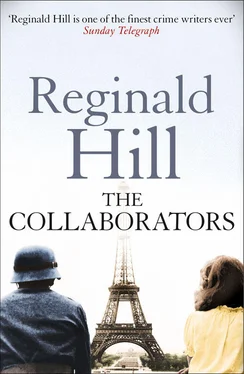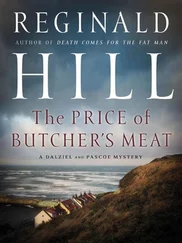‘But he’s alive?’ demanded Janine for the sixth or seventh time.
‘Yes, yes, yes, how many times do I have to tell you!’ said Christian Valois with growing irritation. ‘He got shot in the head. He was critically ill for a long time but now he’s recovering. He’s in a military hospital near Nancy, but soon he’ll be shipped off to join the rest of them at some camp in Germany. But he is alive, he is all right.’
‘Why did he contact you, not me? Why didn’t he get in touch earlier? Why doesn’t he write instead of sending messages by this man Pivert?’
Janine knew how absurd all these questions must sound, but they forced themselves out against her will. The truth was, at first she didn’t believe it, couldn’t believe it, when Valois, unnaturally flushed with suppressed excitement, had burst in, crying, ‘He’s alive! Jean-Paul’s alive!’ Finally, as details of the story began to adhere, there had started these other emotions, erupting like jets of steam from a hot spring, scalding, unforecastable, uncontrollable. Doubt was there, panic, fear, anger and plain resentment. Then the door opened and Pauli, attracted by the noise, rushed in crying, ‘Maman, what’s the matter? Are you ill?’
‘No, Pauli. It’s your father. He’s alive!’
For a moment the little boy stood perfectly still. Then he sat on the floor and began to cry, not the silent, half-concealed tears she had grown used to, but howling like his little sister.
‘Pauli!’ she said, kneeling beside him and hugging him close. ‘It’s all right, my love. It’s all right. Daddy’s alive!’
And suddenly it was all right. Her sobs joined the child’s and at last her emotions ran as clear as her joyful tears.
‘I’m sorry, Christian,’ she said a little later as they sat and drank a glass of wine. ‘I didn’t dare to believe you. Do you understand that? Now quickly, now I’m calm, before Sophie comes back from shopping, tell me it all again so I can break the news to her the best way possible.’
Corporal Major Pivert’s story had been told with an old soldier’s rough directness. He had been second in command of the section in which Jean-Paul was serving. They had held out for a day and a half against a ferocious onslaught.
‘Most of the Boche just went round us, leaving half a company to mop us up. Well, we showed the bastards! Mind you, we took a pounding. It brought us real close together. We’d been a tight-knit group before, got on well despite all our differences, but being under heavy attack together, losing some of your mates, that really binds you close as cement. It’s a grand feeling, but Christ, the pain of it, when another of your mates gets hit. You see, you’re all one. Every wound, every scream, every death, it’s yours. Do you see what I mean?’
Christian said, ‘I think so, I’m trying…’
The old soldier regarded him keenly and said, ‘You’ve had no service, have you, sir? You can’t understand without knowing it for yourself.’
Valois flushed and said, ‘Go on.’
‘It hit Simonian bad. His best mate, a young lad from Auxerre, died in his arms, spilling his guts all over him. I think he’d have gone over the top himself then, trying to take the bastards on single-handed, but the lieutenant stopped him. He was a good lad, that lieutenant. Fucking children they’re putting in charge now, I said when I first saw him. But he was all right.
‘Finally the lieutenant decided to call it a day. Our wireless had packed up, see, and for a long time we thought it was like the first war again, with us part of a long line running all the way from the sea to Switzerland. Little Verdun, that’s what I called the place we was. Except we found when we got the wireless going again, that just about every other bugger had packed up and gone home, or they were sitting on their arses waiting to be rounded up and trucked off east. Well, now the case was altered. Simonian was keen to go on fighting at first, but the lieutenant persuaded him for the sake of his mates to give it up. So we made a white flag, but before we shoved it up, the lieutenant said, “Hold on. Simonian, take this,” and he handed over the dead lad from Auxerre’s pass-book. “What for?” asks Simonian. “So you can chuck your own away,” says the lieutenant. “I was in Berlin before the war and I assure you that you’ll be better off not to have the name Iakov Moseich Simonian in your pass-book when the Boche get round to checking their prisoners.” “No,” says Simonian. “I’m not using these papers, I’m not having his parents told he’s alive and well and a prisoner when he’s lying dead and unburied out here.” “Please yourself,” says the lieutenant. “But let’s have a look at your own book then.” And he takes it and he scratches and tears it, then hands it back, looking right scruffy but no worse than many another after what we’d been through. “There,” he says. “You’ve been christened in every sense!” And I glanced at the book and saw that all that remained of his name was Jean-Paul Simon!
‘Now we waved the flag. The only trouble was that Fritz seemed to be a bit short-sighted. Or more like a bit short-tempered for all the bother we’d caused. So they just shot the flag to pieces and us with it. There were only four of us left alive and of these, only me and Simonian lasted long enough to get to hospital, me with one foot shot off and him with a bullet in his head.
‘And that was it, more or less. They were sawing bits off me for the next few months till they’d got as far as they could go. I didn’t even know Jean-Paul was still alive till a month or so back when I was getting around on my crutch and ran into him, so to speak, in a wheelchair. He didn’t seem to recognize me at first but when we got to talking, I could see it all gradually coming back to him. The thing was, he was still down in the books as Jean-Paul Simon. I asked one of the nurses about him. She said it was sad, he never said anything about his past life and there didn’t seem to be any next of kin to inform. At least he was getting better, though he’d been very ill. Well, I guessed that he was just playing dumb because, having changed his name, he could hardly start talking about a family called Simonian, could he? And from what I heard people saying, the lieutenant had been right. Iakov Moseich was not a good label to wear in the heart of Bocheland, which is where he’ll likely end up.
‘Me, well, there was no use sending a one-legged man to a POW camp, even the Boche could see that. So they decided to discharge me back home. When I told Jean-Paul, he asked me to get in touch with you, Monsieur Valois, and tell you he was alive and well. He didn’t want to risk putting anything down on paper in case I got searched. So here I am and that’s my message!’
‘By the time he finished it was nearly curfew or I’d have come round last night,’ concluded Valois. ‘He slept in the flat and this morning I sent him off with some money.’
‘Did you get his address? Can I talk to him?’ demanded Janine.
‘Of course,’ said Valois. ‘Though not straightaway, eh? I’ll fix it up later. There’s still a slight risk now, and it’s best not to take chances.’
This wasn’t the real reason, but Janine in her joy and excitement was easily persuaded to accept it. The truth was that Valois had other cause to feel uneasy about a meeting between Pivert and Janine. He’d censored all references to the mental scarring left by Jean-Paul’s wound.
‘I knew he was married with kiddies,’ Pivert had said. ‘You talk about these things when you’re under fire like we’d been. But first time I mentioned them in the hospital, he just looked blank. Another time he talked about them, but like he was talking about something in a dream. Most of the time he just wanted to talk about our old comrades. I had to go through how each of them died, he was so desperate to believe that some others might have survived.
Читать дальше












